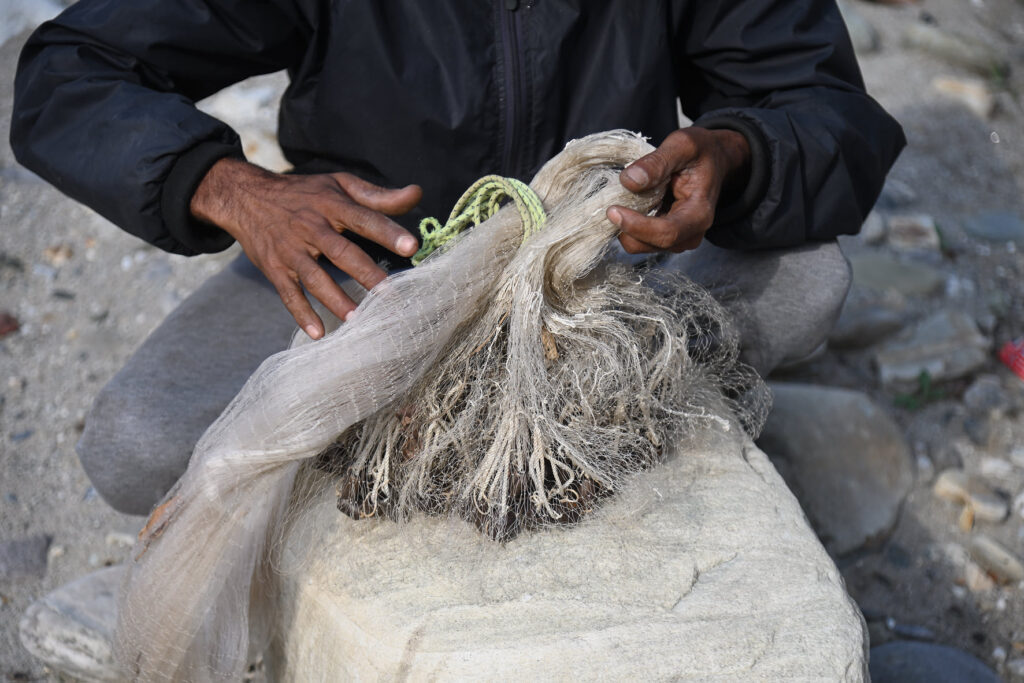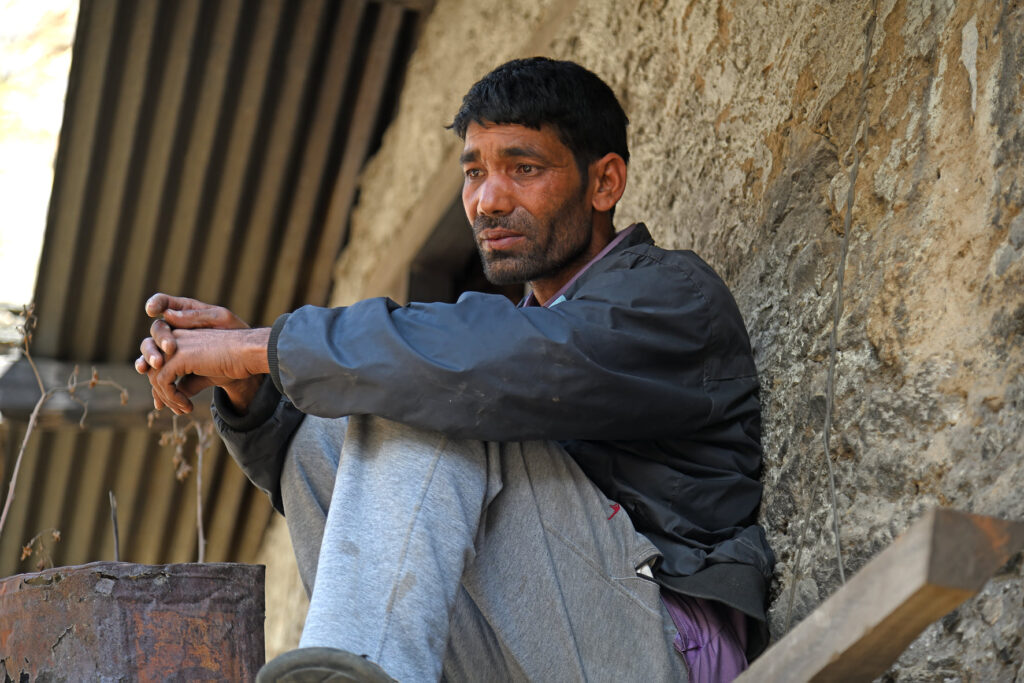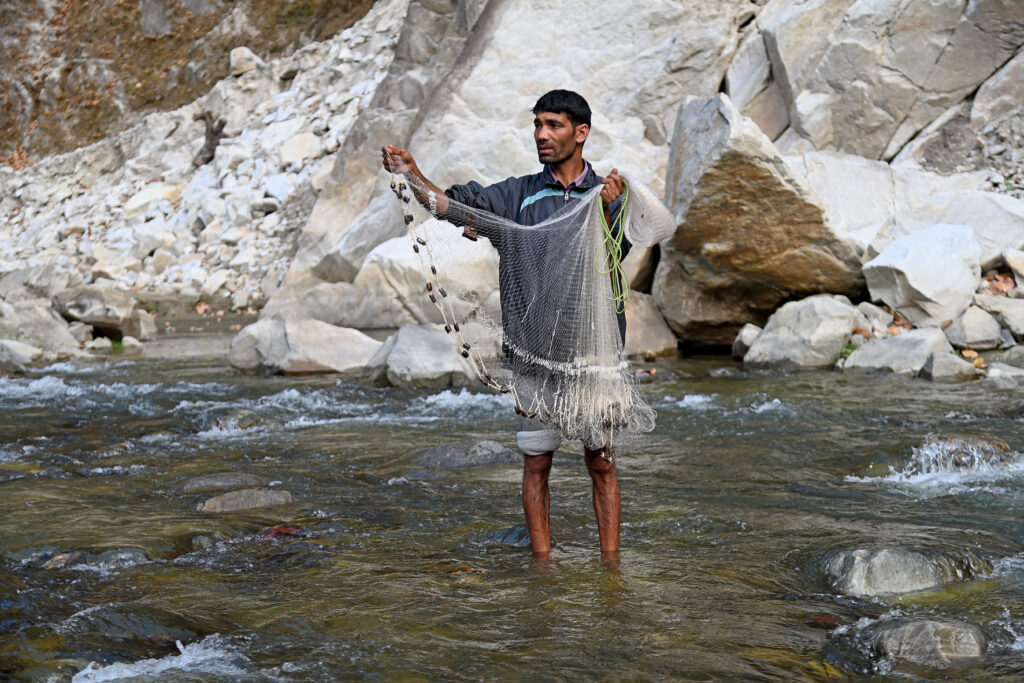
Deepak Badi Daliekh
“When things became difficult at home when food became scarce and worries plenty, I left for India. There I met a man who taught me how to mend radios and watches. I stayed with him for a year. He fed me and taught me the skills I possess today. When I returned home, markets had flourished. Although I was unable to open a proper store due to lack of money, people knew I had skills. So they would come to me and request me to mend their radios and the dials of their watches. I would do what I could with the limited tools I had. They would hand me some money thank me and leave. Some gave me a 100 and some 200.
But the work was tedious. I would spend all day fixing a radio and I would earn only a little. This was hardly enough to feed my family. There were times when we had to skip meals but I was lucky to have a wife who was understanding of my limitations. She did not push me too much. She was supporting me and try to find some menial jobs so that she could complement my earnings.When we moved near the banks of the Ramghat near Karnali, I learnt about the river and fishing. The bridge is a hot spot for people who stop for refreshments. And the fishes of the Karnali are very popular. All the little shops would be crowded. People enjoyed the fresh fish of the Karnali. One night this all made me think. I live by the river but why am I not able to make money. I should do something. Maybe I should start catching fish and supply it to the eateries. I knew there was an opportunity.
The next day I visited the eateries and ask the owner if they would buy my fish. They said they would buy. From that day on, I stopped making radios and watches. I would go to the river spend an hour or two with my net, catch fish and supply it to the eateries by the bridge. Big fishes for 600 kilogram and small fishes for a little less. I was happy that my earning had increased. A lot of us doing the same. As demand grew more fishermen flocked to the river. That slowly started to cause a problem. Once I was able to catch enough fish, now I was only able to catch little. Everyone was catching fish and they got their little share. To catch more fish some people started resorting to poisoning the river and when the dead fishes floated to the surface they simply picked them up and sold them. These people were getting rich while those of us who were naive remained poor. The owners of the eateries had also accumulated a lot of wealth but we Badis, who spent our day knee-deep in water still struggled to survive.I have expressed my concerns to Paani Project’s staff who came to visit. He talked to me about conservation and how the river and the fish were being destroyed. He asked me if I would be interested in forming a group that works for the protection of rivers and fisher along with our livelihood options. This was a new thing for me. Paani Project assured me that I would still be able to fish but there would be regulations for everyone. The idea appealed to me because with this program in action everyone had to abide by the same rule. With the new knowledge about conservation, we fisherman’s have changed our ways. Now, no one is seen poisoning the Karnali River and no one is seen using a net with tiny holes.But, we Badis still struggle. Most of us, not educated to climb the ladder of success and still have to rely on the river for our livelihood. There were talks of diversifying our livelihood but nothing has come to fruition. I think today when we talk of conservation, we should not only talk about biodiversity and fish but we should also talk about poor people like us living on the riverside for ages. We need to be conserved as well.
(Deepak Badi represents a member of the Badi community living on the bank of Karnali in Dailekh district and depending on the river for his livelihood. He is a member of the Ramghat Matela Community Aquatic Animal Conservation Group (CAACG) formed and registered with the support of the USAID Paani Program. He is actively raising voice for the socio-economic development of Badi communities)





“घरमा खानलाई पनि धौधौ पर्न थालेपछि साह्रै गाह्रो भयो, अनि धेरै पिर परेर म इन्डिया गएँ । त्यहाँ एकजनाले मलाई रेडियो घडि बनाउन सिकाइदिए । म ऊसँग एक वर्ष जति बसेँ । उसले नै मलाई खानलाउन दियो अनि त्यस्तो सिप सिकाइदियो । म घर फर्किँदा बजार विस्तार भइसकेको थियो । ठीकै खालको पसल खोल्ने अवस्थामा पनि म थिइन । तर मान्छेहरूलाई मेरो सिप बारे थाह थियो । त्यसैले उनीहरू मकहाँ आएर रेडियो र घडि बनाउन दिन्थेँ । मसँग भएको सिमित स्रोतसाधनको प्रयोग गरेर मैले सक्ने जति बनाइदिन्थेँ । मलाई धन्यवाद दिँदै हातमा केहि पैसा दिएर जान्थे । कसैले १०० रुपैयाँ दिन्थे, त कसैले २०० रुपैँया ।काम साह्रै पट्यारलाग्दो थियो । दिनभरि रेडियो बनाउँदा केहि पैसा मात्रै हात लाग्थ्यो । परिवार पाल्न त्यति पैसाले कहाँ पुग्थ्यो र ।कहिलेकाहिँ त छाक टार्न नसकेर भोकै परिन्थ्यो । तर मेरी श्रीमतीले मेरो बाध्यता बुझ्ने भएकीले म भाग्यमानी नै थिएँ । उनले कहिले पनि केहि कुरामा कर गरिनन् । बरू आफै सानोतिनो काम गरेर अलिअलि कमाएर उनले मलाई साथ दिइरहिन् ।हामी कर्णालीको तिरमा रामघाट बसाईँ सरेपछि मैले नदी र माछाको बारेमा बुझ्नपाएँ । पुलमा रमाइलो गर्न मान्छेहरू खुब आउँथे । कर्णालीको माछा निकै प्रख्यात थियो । सानासाना सबै होटलहरू भिडभाड हुन्थे । कर्णालीको ताजा माछासँगै मानिसहरू रमाइलो गर्थे । एकरात मैले धेरै सोचेँ । म नदीको छेउमा बस्छु तर एक सुका पनि कमाई छैन । अब त केहि गर्नैपर्यो । माछा मारेर यी होटलहरूलाई बेच्नुपर्यो । मैले त्यहिँ अवसर देखेँ ।अर्को दिन ती होटलहरूसँग कुरा गरेँ । मैले ल्याएको माछा किन्ने हो भनेर सोधेँ । तिनीहरूले हुन्छ भने । त्यस दिनदेखि मैले रेडियो र घडि बनाउन छोडिदिएँ । नदीमा जाल लिएर केहि घण्टा बस्थेँ, माछा समातेर पुलछेउका होटलहरूलाई बेच्थेँ । ठूलो माछालाई ६०० रुपैयाँ केजी र साना माछालाई अलि कम पैसा दिन्थे । मेरो आम्दानी बढेकोमा म खुसि थिएँ । म जस्तै धेरै अरूले पनि यस्तै काम गरिरहेका थिए । माछाको माग बढेपछि अरू मान्छेहरू पनि जाल हाल्न नदीमा आउन थाले । त्यसले विस्तारै समस्या पैदा गर्न थाल्यो । पहिले धेरै माछा मारिन्थ्यो, तर अहिले थोह्रै मात्रै समात्न सकिन्छ । सबैले माछा मारिरहेकाले सबैको भागमा अलिअलि मात्रै पर्यो । माछा धेरै समात्ने लोभमा मानिसहरूले नदीमा विष हाल्न थाले । मरेको माछा पानीमा तैरिएपछि समात्न सजिलो भयो । त्यसरी बेच्न थाले । तिनीहरू धनी हुँदै गए । हामी सोझा चैँ गरिबको गरिब । होटल चलाउनेहरू पनि मोटाउन थाले । तर घुँडाघुँडासम्म पानीमा डुबेर माछा मार्ने हामी बादीहरूलाई बाँच्न पनि धौधौ हुन थाल्यो।हामीलाई भेट्न आउनुभएको पानी परियोजनाको सरलाई मेरो समस्या राखेको थिएँ । उहाँले संरक्षणको कुरा गर्दै नदी र माछाको बिनाश कसरी भइरहेकोछ भनेर मलाई बताउनुभयो । नदी र माछाको संरक्षण गर्दै जीविकोपार्जन गर्न एउटा समुह बनाउनुपर्छ । त्यस्तो समुह बनाउन इच्छुक हुनुहुन्छ भनेर उहाँले मलाई सोध्नुभयो । यो मेरो लागि नयाँ कुरा थियो । माछा मार्न त पाइने तर त्यसमा नियमन गरिने कुरामा उहाँले मलाई आश्वस्त पार्नुभयो । मलाई त्यो कुरा साह्रै मन पर्यो किनभने कार्यक्रम लागु हुँदा सबैजनाले एउटै नियम पालन गर्नुपर्नेहुन्छ । संरक्षण सम्बन्धी नयाँ ज्ञान पाएपछि हामी सबै माछा मार्नेहरूले आफ्नो व्यवहारमा परिवर्तन ल्यायौँ । अहिले कसैले पनि कर्णालीमा विष हाल्दैन । कसैले नि सानो प्वाल भएको जाल हाल्दैन ।तर हामी बादीहरू अझै संघर्ष गरिरहेकाछौँ । सफलताको भर्याङ चढ्नको लागि अधिकांश बादीहरू अशिक्षित छन् । जीवनयापन गर्न नदीमा नै निर्भर छन् । रोजीरोटीको अरू विकल्प खोज्न धेरै गफहरू भए, तर केहि हात लागेको छैन । संरक्षणको कुरा गर्दा माछा र जैविक विविधताको रक्षाको कुरा मात्रै गरेर हुँदैन । हामीजस्ता नदीको छेउमा वर्षौँदेखि बस्दै आएका गरिबहरूको पनि कुरा गर्नुपर्छ । हामीहरूको पनि संरक्षण हुनुपर्छ।”(दिपक बादी, रामगाड, आठबीस-१, दैलेख)(दिपक बादी दैलेख जिल्लामा कर्णालीको तिरमा बस्ने बादी समुदायको एक सदस्य हुन् । युएस्एड पानी परियोजनाको सहयोगमा स्थापना तथा दर्ता भएको रामघाट मटेला सामुदायिक जलचर संरक्षण समुहको उनी सदस्य पनि हुन् । बादी समुदायको आर्थिक सामाजिक मुद्दाहरू बारे आवाज उठाउन उनी सकृय छन् ।)





